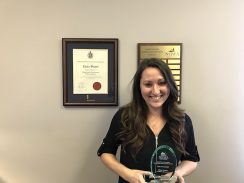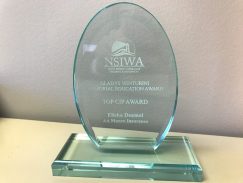2017 Top CIP Award
Interviewed by Angus MacCaull
Of our core values at AA Munro Insurance, personal growth could be my favourite. I love seeing people develop and learn new things.
It’s been exciting to watch Elisha Deamel complete her industry certifications over the past few years. She shared top marks in her graduating Canadian Accredited Insurance Broker (CAIB) class in 2015. And she recently won top marks in her graduating Chartered Insurance Professional (CIP) class in 2017.
Elisha has a background in financial services and currently works as an account manager for commercial insurance. She also leads an active life in Lower Sackville with her husband Mark and their two kids. They enjoy sports and music. And when they can, they enjoy going out to eat. You might spot them at Il Mercato in Bedford.
With so much on the go at work and at home, I was interested to hear how Elisha approached her studies. I sat down with her in November to talk about the certifications.
INTERVIEWER
Congratulations on the award!
DEAMEL
Thank you. I was shocked! And I’m very honoured. With the CIP you can’t see your marks as a number. They only give you a letter, which has a range. So it was a nice surprise to get top marks.
INTERVIEWER
How did your experience with the CIP compare to the CAIB?
DEAMEL
There was a lot more information in the CIP. But I found if I took enough time to go through it all I was okay. I think the CIP was more interesting because it had more examples. And also because you can pick and choose your electives.
INTERVIEWER
Which courses did you like the most?
DEAMEL
Loss adjusting was different. It’s not something we deal with every day as brokers. It was nice to see the perspective and how they go through the process when they adjust a claim. And the underwriting course too. I liked seeing that side of things.
INTERVIEWER
Did either course change how you chat with our partners?
DEAMEL
I think both courses opened up my eyes more to see where our partners are coming from and some of the decisions that they have to make. I think it would be really tough to be an adjustor. They have to take a lot. They’re dealing with someone at the worst possible time. And they have to follow a lot of rules that the general public doesn’t necessarily understand.
INTERVIEWER
Were any of the courses really tough for you?
DEAMEL
I wrote two exams at a time. I found that a lot of the information overlapped in the different courses. Sometimes you’d be studying for one and you’d get some of the same information in the next course. So that was helpful. But if I could go back, I would do the liability exam by itself.
INTERVIEWER
What was hard about that one?
DEAMEL
It was the wording. Actually Harley (MacCaull) put it the perfect way: it’s like a lawyer wrote it. It’s very contractual, the whole thing, the whole way through. And it’s almost as if you misplace one little word, that’s going to make your answer completely wrong. My biggest struggle was to try to find a way to get the information so that it made sense in plainer terms.
INTERVIEWER
How did you eventually do that?
DEAMEL
Honestly I just went over the information again and again and again. I also did the extra credit tests that you can do and pass in. With those you get feedback from the markers. That helped for sure because they were able to explain things a little bit better. I even did a lot of googling online to find different definitions and ways to say things to myself so that I could understand them. Just to make more sense in my mind.
INTERVIEWER
That’s a neat approach!
DEAMEL
There’s lots of legal cases to remember, too. They put a lot of examples in there for liability. It was a little bit daunting and took a little more time to get it all in there and remember it all. I used a notebook to take a lot of notes.
INTERVIEWER
Good call.
DEAMEL
Actually I did the study guide and questions not just for liability but for all the chapters. I would always write my answers out. If you write the answers out to the questions that they are providing you and you study that over and over again—they take all of those questions and they might reword it a little bit or change the names that they use, but that’s all on the exam. So I was big on writing the answers out. And taking all the practice tests.
INTERVIEWER
What did your kids think of Mom doing all this homework?
DEAMEL
[Laughs] They would always ask me with every exam I wrote, Mommy when are you going to be done studying? How many exams do you have left to write now?
INTERVIEWER
[Laughs]
DEAMEL
They’re glad that I’m done for now. My husband is too! Probably because he was very supportive, so it’s good to have me back a little bit. I wouldn’t have been able to do it without him taking on more responsibility with them, keeping them occupied when I was studying and being there for that aspect of it. He was a big help for sure. Even on my study days: he would take the kids the day before the exam and I would have the whole day.
INTERVIEWER
How does it feel now that you’re done?
DEAMEL
The main thing for me is an increase in confidence. When I’m talking with a customer or even with an underwriter, I have a greater understanding. It’s really boosted my confidence to be able to provide the best service. I still double-check things, but instead of questioning myself so much maybe after a tough interaction, I’m more confident in what I know.
INTERVIEWER
Do you have any advice for others out there doing their certifications?
DEAMEL
Definitely put the time in and it’ll all come together. Don’t give up and review the information as much as possible. Even if you go through the first time and feel that it doesn’t make any sense to you, take your time and go through it again. I think that’s the biggest key: you have to give yourself enough time to go through the information that’s in the courses in order to make sure that you’ve got it all retained and you’re understanding it. And also ask for help when you’re stuck. Somethings it just takes one person saying something a certain way for everything to click!






Leave a Reply